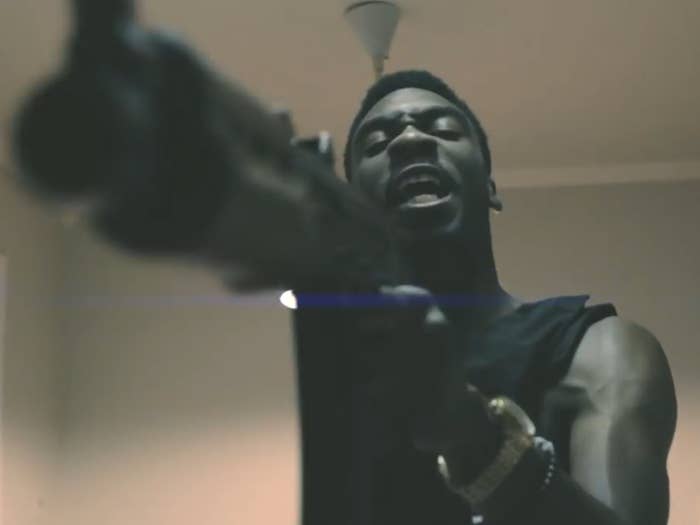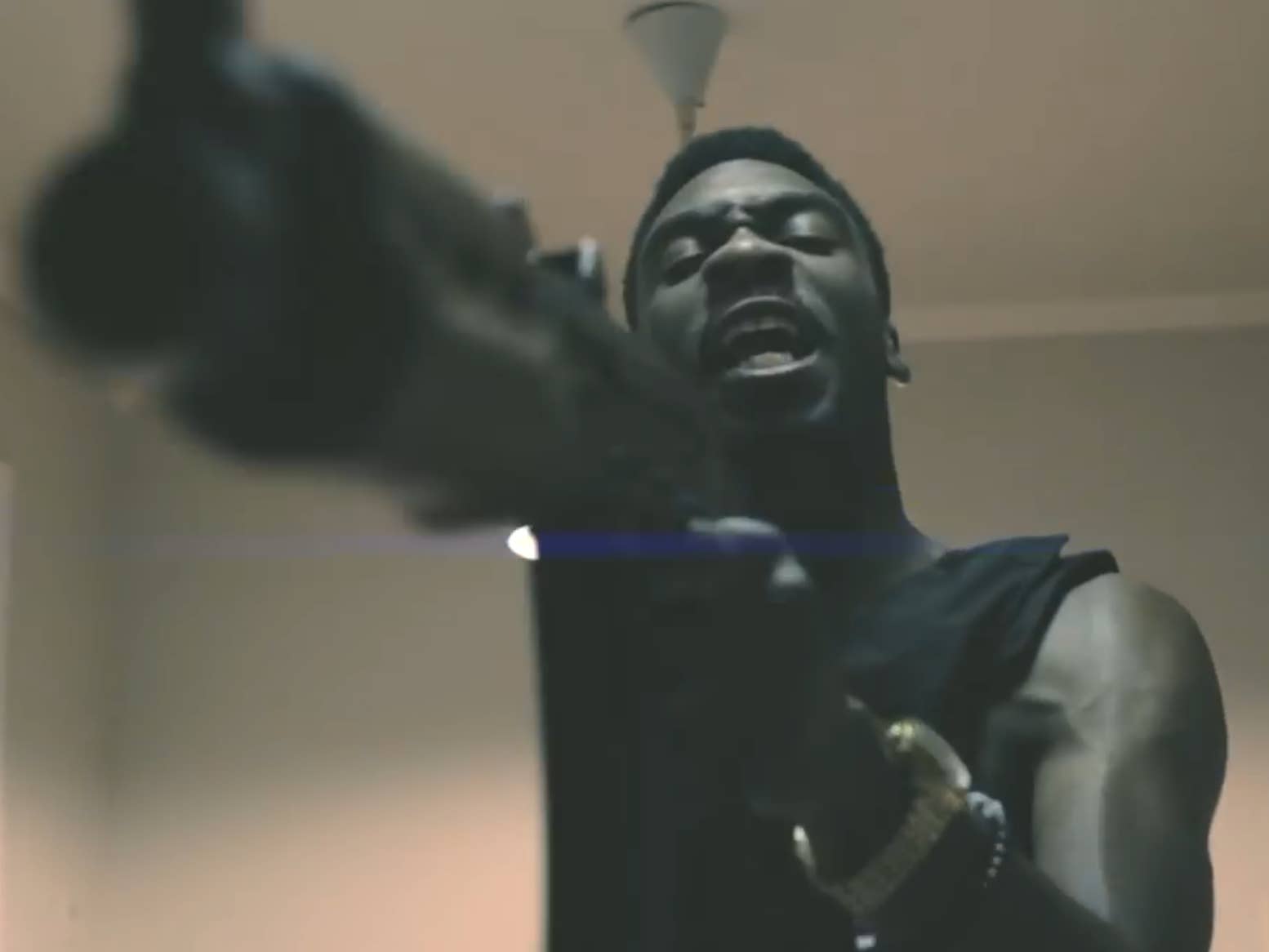
22-year-old Dallas rapper/producer T.Y.E. is bipolar. His diagnosis last year put a painful capstone on his time at Abilene Christian University, the college he'd been admitted to on an opera singing scholarship some three years prior. He lived in "mostly white" west Texas—where Abilene Christian resides. T.Y.E. cites the seething hatred and virulent racism of a place "not used to a n*gga who could sing with the best of the white people" as the primary reason he dropped out of school to pursue rapping full time. He attempted to kill himself late in 2015 and was committed to a mental institution where, after years of silent suffering, his bipolar disorder finally received proper attention.
He volunteers all of this information with little prodding and almost no sugar-coating; his speech sounds measured, but never at the expense of honesty ringing in each of his responses and observations.
He also resembles a young Eddy Murphy, a fact highlighted by one of his representatives, but also volunteered by T.Y.E. out of the blue at one point in conversation.
"My face isn't inviting," he says. "I look hard, I've been dealing with that my whole life. I look like a young Eddy Murphy."
As clickbait journalism and dubiously vetted news rule the day, the sheer randomness and curious collisions of T.Y.E.'s story seem like raw meat for ravenous writers and page view-fueled publications (though it's worth noting that provocation "journalism" isn't new, as this excellent Observer piece from Tuesday pointed out). This article isn't entirely above the tantalizing proposition of using the toothsome details of T.Y.E.'s story—these same details were part of the pitch that led to this piece's existence.
In T.Y.E.'s case, characteristics that could be used as an unsavory lure provide crucial context for understanding his music; they're the honest conditions of his young life. As we wrap our conversation, I ask him if he's alright with me using everything we've discussed. I tell him I plan to bluntly describe his battle with bipolar disorder and discuss the unusualness of his operatic background.
"Have at it," he reassures me.
Matter of fact assurance colors everything T.Y.E. speaks about, from his battles with bipolar disorder (and the sorts of silent war of mental ailments he believes besieges the community he grew up in) to the quality and intent of his creative pursuits. T.Y.E.'s music is expressive and imaginative, but he doesn't have much use for coded language in conversation. This bluntness may be born in part from the pressure of his upbringing in Oak Cliff, one of Dallas' tougher neighborhoods.
"It's not really a good part of town—I'm just gonna go ahead and say it's the hood," T.Y.E. says. "Everybody always prays...you know, hood n*ggas in hood living. When you really in that ho, you really try to find any way that you can to get out. It's mostly the fake ass n*ggas that really want to be drug dealers and killers and shit and like to praise all that shit. If you got a way to get out that ho, I suggest you get out that ho by any means."
Music entered T.Y.E.'s life at an early age. His father Richard Harris (a.k.a. Rich E Blaze) was a music producer who left the family to pursue work in Los Angeles with artists including Bone Thugs-N-Harmony and Diane Warren (perhaps a sign of the eclectic blood in T.Y.E.'s lineage). His brothers rapped and he often played fly on the wall in their sessions, taking on the role of recording engineer by necessity from time to time. Soon T.Y.E. started writing his own raps.
By high school, music illuminated an unexpected path out of Oak Cliff.
"In school, I was playing basketball and I needed another elective so I could pass all my classes—I needed an easy as class, right?" T.Y.E. says. "I saw that this choir class had the hoes in it, so I tried it, but then I had to do some actual work. I had always liked different music, but I had never really put my foot in it. I had always liked Mozart and shit, just listening to the music off of commercials."
Passing fancy turned into passion as the choir class motivated T.Y.E. to learn about music he'd only casually explored prior.
"I started actually studying [classical] music, knowing what nationalities and cultures it was coming from, studying the art of singing in a core way," he says before tying it back to the hip-hop that forms his bedrock. "And then of course Gucci Mane has this song called 'Classical' where he was sampling some classical music too. That influenced me."
T.Y.E.'s elective exploration and newfound dedication led to a full-ride opera singing scholarship to Abilene Christian University.
"By any means necessary—nobody was on my ass talkin' 'bout some 'you ol' opera singin' ass n*gga,'" he says of his way out of Oak Cliff. "Of course you gon' have a couple haters, but most of the people were like 'I fuck with you.' It was just different, so I did it."
Solace from Dallas' harsh reality proved fleeting as T.Y.E. entered a new nightmare.
"There was a lot of racism," he says of Abilene Christian. "The Ku Klux Klan, people putting racial slurs on my car...a black opera singer in a mostly white world wasn't normal to them. That was why I had to leave, that was fucking with me. I was abusing Adderall, I was abusing drugs. I just didn't go to class anymore, I was in the studio."
Jagged new single "La La Land" (which you can watch above) embodies T.Y.E.'s grapple with the fright of waking hours and the violent swings of manic depression in an ambitious, serpentine six and a half minutes. It stems from the darkness that engulfed him around the time that he dropped out of Abilene Christian.
"'La La Land' was more of an emotional thing...more trying to let you know about being bipolar and how quick things can turn," he says. "It came from trying to kill myself, knowing that 'La La Land' is supposed to be a better place than what I'm in right now."
Ethereal electronic atmosphere builds to booming 808's and an almost Death Grips-like sonic assault, all while incorporating T.Y.E.'s striking singing and visceral rapping. It's the kind of dizzying song that could scare off casual listeners. It's as complex and densely layered as T.Y.E.'s story, an abrasive listen demanding repeat plays for full digestion and decoding.
Though "La La Land" speaks to the violent shifts experienced by a person diagnosed as bipolar and the desire to find solace somewhere, it also speaks to the suffocating atmosphere that both sparked and stifled T.Y.E.'s condition. This paradox isn't singular.
"I started showing symptoms in the 7th grade," he says of his disorder. "I was angry all the time for no reason. I didn't even know what was happening because in the black community there's no such thing as a mental disorder. It's either you're strong or your weak. Of course I don't want to be looked at as no weak ass n*gga, so things like getting an education were furthest from my mind because I didn't want to spaz out on nobody. In order to evade that conversation and people thinking I'm weak, I'm just going to act like I don't want to study, like I don't want to do my homework. Really I'm trying to take care of something else that's going on in the back of my mind. So that makes it hard."
T.Y.E. believes the solution begins through comprehension and honest labeling, knowing that certain actions have deeper roots and meanings..
"It starts with understanding our problems, and understanding what we're faced with—the psychological aspect and the emotional aspect," T.Y.E. says of life in communities like Oak Cliff. "You're just always thinking about getting money and you don't know what your brain is doing to try to survive and preserve the little reality and happiness you have left."
His own dark night of the soul brought him clarity about the behavior and attitudes of people with whom he'd grown up.
"When I came out of the mental hospital, I looked at some of my friends and some of my peers and was like, 'you act like the schizophrenic that I met in the mental hospital, I think you should be checked,'" he says. "When you look at your surroundings, and you open your eyes and you're enlightened about the situation, you're like 'damn, my friends are bipolar...I hung around with nothing but schizophrenic, depressed motherfuckers...this n*gga has anxiety, that's why he smokes so much, that's why he drinks so much, because he's been through a traumatic experience. That's they start doing dumb shit."
T.Y.E.'s music provides a deeply personal outlet that creates a lens for understanding the world he comes from and what it does to its inhabitants.
"I feel like people understand and identify that with me and they can relate to me because of the music, how I have different voice inflections—I change up my voice when I want to be angry, I change up my voice when I want to be conscious," he says. "It's just to be able to relate to those types of emotions and identify those things that go on in someone's head."
His debut album comes out early next year on POW Recordings.
We're switching things up. 5 On It is now going to come at the end of each month. In its place, a new artist will be highlighted on the first and third Saturdays of each month. You can also enjoy some favorites from the past on our new 5 On It Spotify playlist, which you can check out below.

